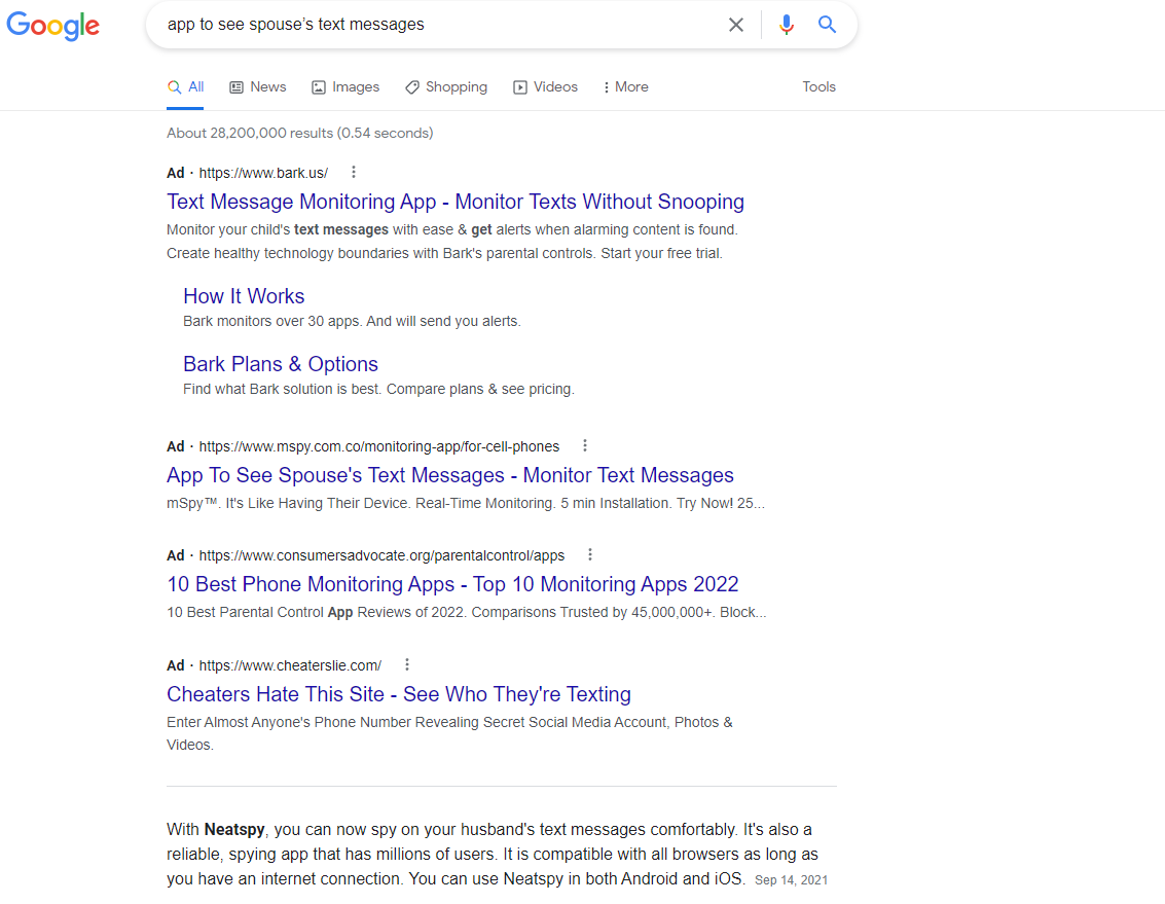Products that claim they’re used for keeping track of wayward children also advertise themselves for tracking strangers or one’s significant other.
If you’re concerned that somebody might be trying to track you through your phone, then just be aware they might be getting help from Google’s ad policies.
As first reported by MIT Technology Review, stalkerware companies are easily getting around the tech giant’s ad restrictions on spyware, showing up with a simple search for products to keep track of a partners’ phone or to review other’s text messages.
Google’s advertising policies for stalking apps—last updated in August, 2022—clearly state that spyware and other surveillance technology are explicitly banned from advertising in search results. The policy does not apply to apps designed to help parents track children or employers track their workers’ company devices.
But Gizmodo confirmed that a simple search for phrases like “app to see spouse’s text messages” or “see who your girlfriend is texting” brings up multiple ads for products that explicitly allow remote access to SMS and texts. Ads for certain products like mSpy make it clear they are useful for monitoring other people’s phones, even if their websites claim they are meant to be used by parents keeping track of their children.
Representatives for mSpy did not immediately respond to a request for comment about their advertising policies.
Despite the most popular search engine’s advertising policies being in place for years, the problem is nothing new. Certo Software, a mobile security company, wrote in a blog post last year about several companies blatantly selling partner tracking software in search ads. The company mSpy came up with problematic ads in that report as well.
Google claims it works to identify products that disguise their original intent, but Jan Penfrat, the senior policy advisor at European Digital Rights, told MIT Tech Review that the tech giant’s ad screening is done via outdated algorithms where “research has shown over and over again that it’s pretty easy to circumvent them.”
Google told MIT that they removed offending ads after it brought them to the company for review, but a simple search shows that clearly there are still many results that advertise directly as stalkerware that come through at the top of results.
And those that say they’re meant to monitor children by parents also offer advice and tools for breaking into any phone. Advice used to hack into a child’s phone can easily apply to hacking into a partner’s phone, or potentially into a stranger’s phone. Tracking app Xnspy includes a disturbingly detailed guide for hacking into someone else’s phone, giving step-by-step instructions on how to steal someone else’s phone while they’re asleep or remotely access the settings menu on a separate device.
Stalking, with and without technology, remains a huge problem across the world, but the Stalking Prevention Awareness and Resource Center reported that 13.5 million people are stalked annually in the U.S. alone, and that 1 in 3 women have experienced stalking in their lifetimes. More than twice as many victims are stalked with technology then without, according to the U.S. Department of Justice.
In response to a request for comment, a Google spokesperson said “We do not allow ads promoting spyware for partner surveillance. We’ve reviewed the ads in question and are removing those that violate our policy.”
However, it’s not just stalkerware that’s easily getting around Google’s policies. Earlier this week, Gizmodo broke the story that Google was planning to change its ad restrictions to allow FDA-approved stem cell products to advertise in search results. This is despite the fact that ads for gene therapy and other skeevy treatments were appearing as ads directly on top of search results, despite current rules banning stem cell advertising.
And despite the U.S. Federal Trade Commission putting some pressure on the stalkerware industry, the fact that most of these companies continue to openly advertise their products means that it’s the rest of the tech industry that needs to step up to squeeze out their influence. Google obviously needs to do more.
Tags:
Google


